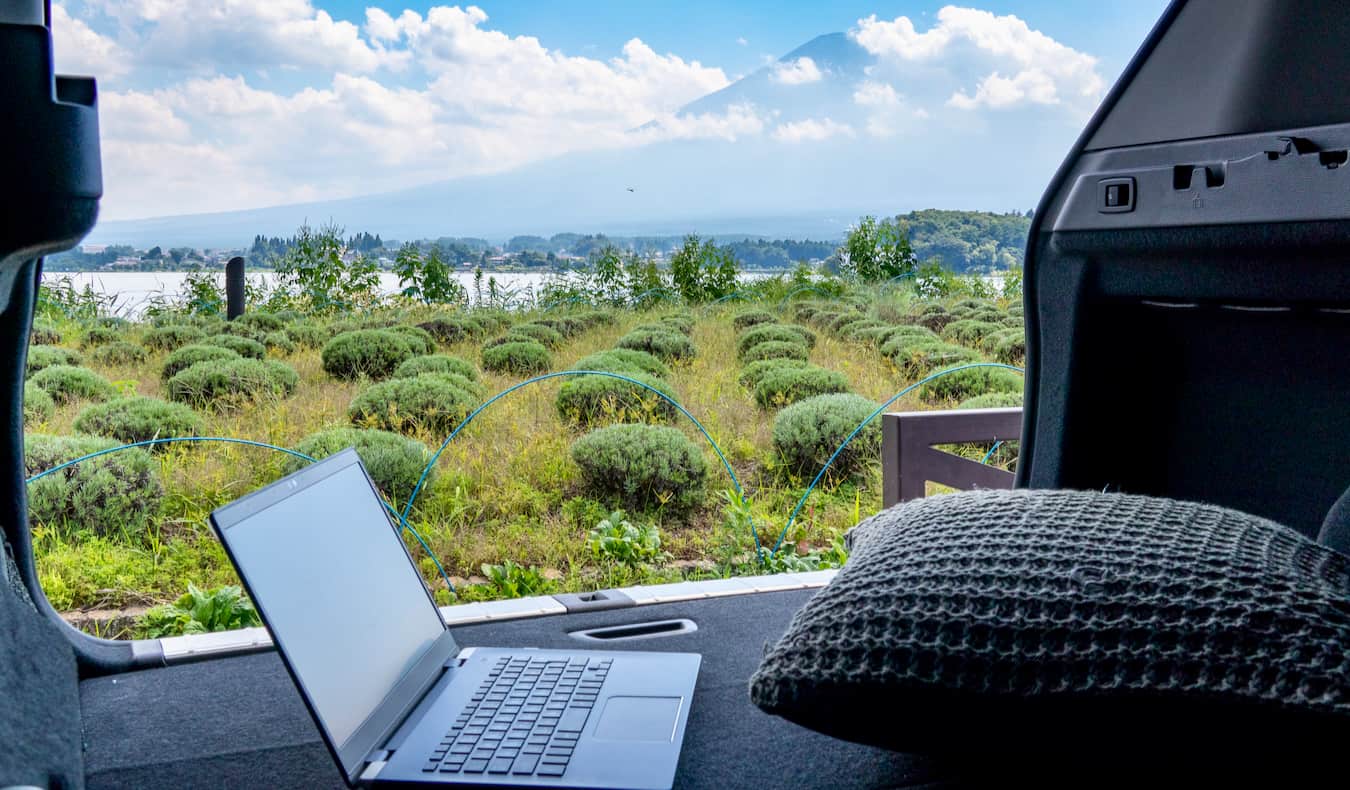
Last Updated: 8/23/23 | August 23rd, 2023
I’ve been working online since 2008. Back when I started, “digital nomading” didn’t even have a name. The whole concept of remote work has changed a lot since I started. These days, there’s more options, better Wi-Fi, and accommodation that makes it easy to work online.
From bustling cafés in Paris and laid-back co-working hubs in Medellín to airport lounges and beach joints with dodgy Wi-Fi, I’ve worked pretty much everywhere over the past 15 years.
Being able to work from anywhere in the world is an amazing gift. It has opened all kinds of doors I never even knew existed before I started traveling.
However, it isn’t all fun and games. It’s still work.
While I have the flexibility to make my own hours, I still have to put in those hours. Sometimes that can be challenging. Between finding places with fast Wi-Fi, meeting people and networking, balancing work and travel days, being a digital nomad can be tricky if you’re not prepared.
It’s not easy to do, because if you both work and travel, one of those things tends to suffer — especially if you’re not staying in a destination long-term. The faster you move around, the harder it is to balance work and play. In the past, this even led me to have panic attacks.
Most people I know who work remotely have had struggles finding their own personal balance. It takes time and knowing yourself.
As post-pandemic life continues to reshape how we work, and as remote work becomes both more feasible and popular, I thought I’d share a few tips to help new remote workers and digital nomads adjust to working abroad. These tips have helped me find the perfect balance and they can probably help you.
Table of Contents
1. Have Work Lined Up Before You Go
Contrary to popular belief, you shouldn’t just quit your job and then dive into life as a digital nomad. While it might be tempting to throw caution to the wind and jump into this new and exciting experience, it’s a much smarter plan to start before you leave home.
Most businesses take several months to start making money (and blogs can take years). Unless you have a ton of savings to live off of, I wouldn’t suggest you start your new digital nomad job while abroad. Do so at home first. Build your client list, so that by the time you leave, you’re already making some money. That way, you won’t be stressed out trying to launch a business and travel the world at the same time.
2. Set a Clear Divide Between Work & Travel
Balance is one of the hardest things about working remotely abroad. In a new country, it’s easy to spend too much time traveling and having fun and not enough time working. New foods, new attractions, new people — all of that can tempt you into spending a bit too much time off the clock.
To make sure you get your work done, set clear boundaries for when you work and when you go exploring. The best digital nomads have strict calendars to ensure they get everything done. Maybe you dedicate entire days to one or the other; maybe you divide up each day. Whatever strategy you choose, stick to it. This ensures you get your work done while also getting to experience the destination.
Live by your calendar and you’ll find yourself a lot less stressed because you’ll know that there’s time for everything – because you planned it that way!
3. Travel Slow
The best way to balance your work and travel — and get to know destinations in incredible detail — is to go slowly. Don’t head to a new city every other day. Don’t move cities even every week. Consider spending weeks (if not months) in one place.
That way, you’ll have plenty of time to build productive habits and routines while getting an in-depth experience of the destination you’re in. You’ll be able to play tourist, network, attend events, and get a feel for life there more than the standard tourist does. I can’t recommend this enough. Quality over quantity!
4. Check the Wi-Fi
When you work online, fast Wi-Fi is vital. Before you choose your destination(s), take a look at the Wi-Fi situation. Is it easily accessible? Is it fast? Can you get a SIM card for reliable data?
Every country varies, and even regions within countries vary, so be sure to do some research before you go. This is especially important for anyone working with video or photography who has to upload large files.
To find out more about the Wi-Fi speeds in different countries, use nomadlist.com. It’s a great resource for digital nomads that will give you an up-to-date look at the Wi-Fi situation where you’re going (among many other factors).
Moreover, before you rent an Airbnb or long-term stay, ask the owners to send you a screenshot of their Wi-Fi speed. I’ve spent a lot of time trying to find good Wi-Fi in countries and I can tell you nothing kills your productivity than spending the day finding good Wi-Fi when you could have it at your place from the start!
5. Connect with Locals & Expats
One of the best things about travel is the people you meet. As a digital nomad, you’ll get to embed yourself into a community for longer periods of time than a tourist would. You’ll be able to network, attend events, co-work with people, and meet travelers and locals alike.
So, make sure you get out of your shell and connect with other people regularly. Not only will it be fun but the networking opportunities can help your business. Meetup.com and Couchsurfing are two easy places to start.
Additionally, stop by a nearby co-working space. It likely has regular events worth checking out. Coworker.com is a good resource for finding such spaces.
6. Get a VPN
As a digital nomad, you’ll be connecting to Wi-Fi networks in all kinds of places. Banking, personal messages, email — they can all be accessed if you aren’t careful. Make sure your information is protected by using a reliable virtual private network (VPN), which masks your online signature so your data can’t be stolen. Just like you’d secure your valuables in a hostel locker or hotel safe, you also need to secure your online data while abroad. A VPN like TunnelBear can help you do just that. They have comprehensive coverage for just $3.33 USD per month (they also have a basic free plan so you can try them out first).
7. Invest in Noise-Canceling Headphones
If you’re one to get easily distracted (or if you have a lot of meetings you need to attend), invest in a good pair of noise-canceling headphones like the wireless Bose QC 35 II, which are great for working in busy environments (such as co-working spaces) as well as on buses or planes, where there is ambient noise from the vehicle itself. If you like peace and quiet when you work, these are a worthwhile investment — especially if you’re going to be working in all kinds of unconventional places!
8. Get Travel Insurance
I never leave home without travel insurance. I’ve had too many mishaps — not to mention the hundreds of injuries and inconveniences I’ve heard about over the years from readers. From lost luggage to delayed flights to petty theft, travel insurance ensures that you’re made whole after things go sideways (and if you’re on the road for a long time, things will eventually go sideways).
I strongly recommend SafetyWing. Its plans are designed specifically for digital nomads and long-term travelers and feature super affordable monthly rates (with deductibles), making them one of the cheapest options out there. The customer service is top-notch and their plans cover all the basics. If you’re a digital nomad just getting started, this is the company I would recommend.
You can read my SafetyWing review here if you want to learn more.
9. Check the Time
If you have a job that requires meetings with other people, make sure to keep time differences in mind. You don’t want to be waking up at 4am for a conference call or have emails flooding in right when you’re about to log off for the day.
That’s not to say you can’t travel to far-flung destinations, but you’ll need to communicate the time difference to your team and/or clients. Let them know where you are and when they can expect a reply. That way, you won’t feel pressured to wake up at random hours for emails or calls. You can use Time Zone Converter for that.
10. Bring a Water Bottle
Tap water in much of the world isn’t safe to drink. Sure, maybe it won’t kill you, but it can wreak havoc on your digestion for days or weeks or months on end. While bottled water is an affordable alternative, it’s incredibly wasteful. Destinations all around the world are struggling with pollution from single-use plastic, much of which ends up in the ocean.
Be a responsible traveler and get yourself a reusable bottle with a built-in filter. LifeStraw makes ones that remove 99.9% of bacteria and parasites, keeping you safe as you travel the world. Another great option is SteriPen, which uses UV light to get the same result. Either way, bring a reusable bottle so you can safely drink water while avoiding single-use plastic.
11. Don’t Forget to Log Off
When I first started out, I definitely had problems with this. When you’re your own boss, it’s all too easy to constantly be working: checking your email here and there, planning projects, working from bed when you should be sleeping (or out sightseeing!). While starting a new business entails a lot of work, always make sure you set boundaries. Email can wait. Projects can wait. Follow your work schedule. Don’t fall into the trap of overworking.
The Internet never stops and it will take all you give it. Don’t let it control you. Because it’s very easy for those “few hours of work” to turn into an entire day in a cafe.
The whole point of working abroad is to experience life in a new country. Don’t waste the opportunity.
Life as a digital nomad is incredibly liberating. While it takes a lot of hard work and organizational skills, it also provides incredible flexibility and opportunities.
However, it’s still a job, and that means you need to be smart about how you go about things. By following these simple tips, you’ll be able to start your career as a digital nomad on the right foot and avoid the most common pitfalls.
Book Your Trip: Logistical Tips and Tricks
Book Your Flight
Find a cheap flight by using Skyscanner. It’s my favorite search engine because it searches websites and airlines around the globe so you always know no stone is being left unturned.
Book Your Accommodation
You can book your hostel with Hostelworld. If you want to stay somewhere other than a hostel, use Booking.com as it consistently returns the cheapest rates for guesthouses and hotels.
Don’t Forget Travel Insurance
Travel insurance will protect you against illness, injury, theft, and cancellations. It’s comprehensive protection in case anything goes wrong. I never go on a trip without it as I’ve had to use it many times in the past. My favorite companies that offer the best service and value are:
- SafetyWing (best for everyone)
- Insure My Trip (for those 70 and over)
- Medjet (for additional evacuation coverage)
Want to Travel for Free?
Travel credit cards allow you to earn points that can be redeemed for free flights and accommodation — all without any extra spending. Check out my guide to picking the right card and my current favorites to get started and see the latest best deals.
Need Help Finding Activities for Your Trip?
Get Your Guide is a huge online marketplace where you can find cool walking tours, fun excursions, skip-the-line tickets, private guides, and more.
Ready to Book Your Trip?
Check out my resource page for the best companies to use when you travel. I list all the ones I use when I travel. They are the best in class and you can’t go wrong using them on your trip.


